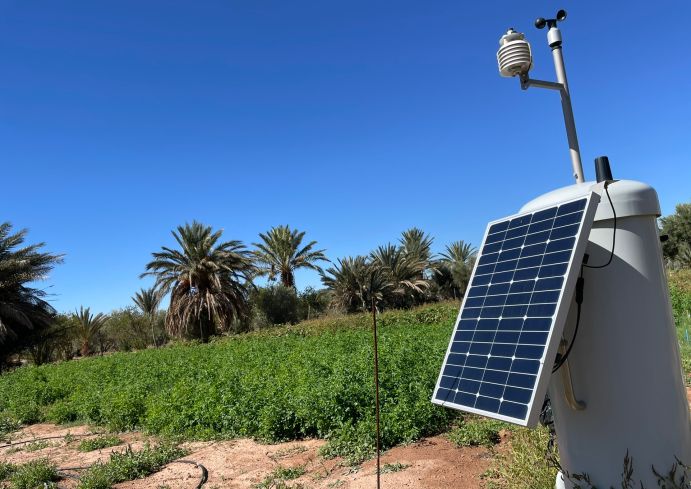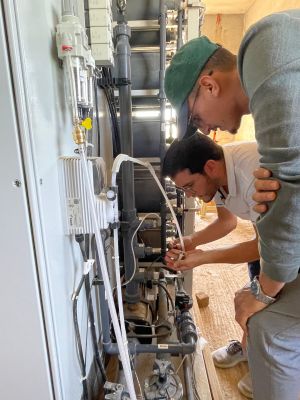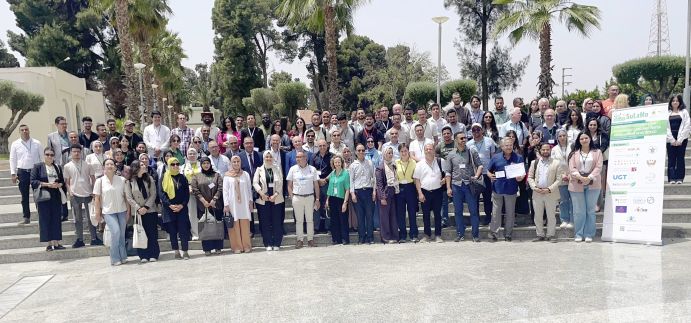Innovative, sustainable solutions for agriculture in water-scarce regions
In deserts and extremely dry areas, climate change is exacerbating water scarcity. The BMFTR project SuLaMo used modern technologies to improve land management for agriculture in these regions.

Water is a vital resource – for humans, animals and plants. However, water scarcity is particularly acute in extremely arid regions such as Morocco. Global warming is exacerbating this situation and making the search for new forms of water management even more urgent. One focus here is on agriculture in order to strengthen food security for the population. For this reason the Federal Ministry of Research, Technology and Space (BMFTR) has been funding the project 'Sustainable Land Management in Morocco (SuLaMo)' since 2022. The German-African research project developed new, water-saving agricultural solutions and presented them at a final conference in Meknes, Morocco, on 26 and 27 May.
Sustainable solutions for agriculture enable water savings of up to 30 per cent
The project team focused on water-saving soil and irrigation techniques, such as underground drip irrigation and mulching, and combined these with state-of-the-art technologies for the energy-efficient treatment of non-conventional water sources such as brackish water and seawater. The project team set up pilot plants at three locations in Morocco to test the new solutions on a pilot scale under different climatic conditions. The result: the combined technologies enabled water savings of up to 30 percent in maize cultivation, for example, without any loss of productivity. To further protect the soil from drying out, the project tested the use of straw mulch. This measure also had a positive effect on maize yields.
Project coordinator Prof. Dr. Jan Hoinkis, head of the Water Technology Group at Karlsruhe University of Applied Sciences, explained at the end of the project: "SuLaMo offers practical solutions to increase soil resilience to climatic challenges and agricultural productivity in arid regions. The project is thus making an important contribution to the future development of Moroccan agriculture." These findings are also of great value for the increasingly dry soils in Germany.
A mix of innovative technologies, intelligent real-time monitoring and solar-powered systems – for optimised irrigation

The SuLaMo project used two technologies: In order to use brackish and seawater as unconventional water sources, membrane capacitive deionisation (MCDI) was used to desalinate the water. In the next step, the treated water was transported directly to the roots of the plants via subsurface drip irrigation (SDI). This means that less water evaporates and the plants can use it directly. To make irrigation even more efficient, the project developed a real-time monitoring system: real-time sensors and weather stations were installed directly in the field. This allows irrigation to be monitored and controlled. Farmers can continuously check the soil water balance, the well water level and weather data, and irrigation can be automatically adjusted to the optimum level.
The monitoring system for the irrigation processes and the desalination plant are powered by solar energy, which further increases the sustainability of this solution.
The BMFTR is funding the project with around two million euros as part of the 'CLIENT II' measure for the period from February 2022 to July 2025.
About the SuLaMo project
The project was coordinated by Prof. Dr. Jan Hoinkis from Karlsruhe University of Applied Sciences in collaboration with the University of Kassel, Humboldt University in Berlin, UGT Müncheberg, Irriproject engineering firm in Potsdam, Roth & Partner engineering firm in Karlsruhe, the Ecole Nationale d'Agriculture de Meknès, the Institut National de la Recherche Agronomique, the Université Moulay Ismail, the Association Oasis Ferkla pour l'Environment et le Patrimoine in Errachidia and the Office Regional de Mise en Valeur Agricole in Ouarzazate.
SuLaMo was divided into two phases: the first year focused on the design and installation of the pilot plants, while the subsequent phase 2 was dedicated to commissioning and piloting. In addition, a socio-economic study supported the development of approaches to promote the implementation and exploitation of the concept by the participating companies.




